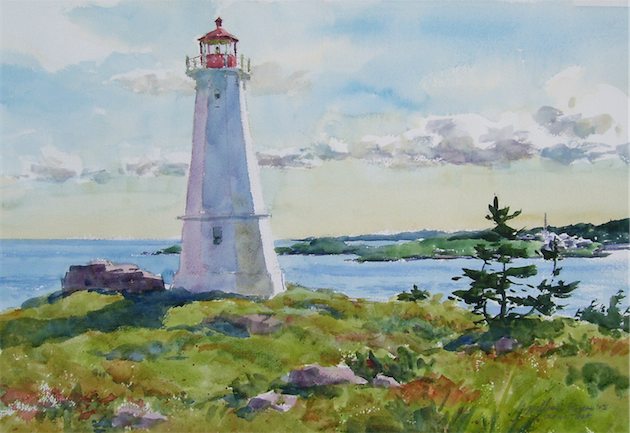
For artist William Rogers, watercolour is his choice of medium for painting landscapes. For aspiring artists who want to learn more about working with watercolour, the prolific, award-winning painter will be conducting a “Painting in Plein Air” workshop at the Gaelic College in St. Ann’s during the weekend of June 18-20. Each day will start with a demonstration from Rogers, followed by a chance for participants to work on their own projects while getting the instructor’s tips and feedback.
“En Plein Air” is a French expression for the activity of painting outdoors in “open air.” Rogers explained that painting in the midst of the landscape subject trains the eye, and gives the artist a better sense of the environment. “When you’re outdoors, you can see into the shadows, whereas if you’re painting from a photograph the shadows just appear dark,” he said. Being in the midst of a landscape demands more more creative work from the artist to simplify a large, complex, dynamic milieu into something that can be represented on a piece of paper.
Watercolour is often known to artists as being a more difficult medium to work in, since each stroke of a brush or splash of water and paint on the page can’t be painted over as it can in other mediums such as oil. But for Rogers, this “transparency” of watercolour is one of its appeals as his choice medium, and it allows him to capture light in his landscapes. “With oil, you have to paint all the light, whereas with watercolour there is no white paint, just the white of the paper. You just paint around the areas of light in different transparent layers…watercolour has this wonderful luminescence to it because of its transparency,” explained Rogers.
The other appeal of the watercolour medium is a more practical one. Watercolours don’t require mixing with chemical thinners, which makes them more portable and less messy than other mediums. Their quick drying time and the ability to bring many sheets of paper and a single board makes it easier for the artist to pack and unpack the materials from a portfolio case, in contrast to the slow drying time and thicker canvases used for oil or acrylic. For Plein Air painters, portability is an important consideration.
Rogers explained that the medium of watercolour doesn’t have the institutional art school history that some other mediums do. The instruction and learning around the medium has traditionally passed along in the artist-to-artist manner of workshops like the upcoming one at the Gaelic College. “With some instruction you can learn not to be perturbed with the medium… An instructor may educate you to the point where you let go and go with the medium, take advantage of the ‘wet look’ and the spontaneous aspect of it; you put paint on the paper and it bleeds and spreads and does different things.” While Rogers points out that there is no right or wrong way in art, having the feedback of fellow artists and instructors can be useful in keeping upstart artist from having to learn everything from one’s own trial and error. “Workshops just help you straighten out your journey.”
The North-Sydney born artist has collected a number of awards over the years, including the two awards from Colonie Art League in Latham NY, and one from the Pittsburgh Watercolour Society. Rogers is an Elected Member of the Canadian Society of Painters in Watercolour (CSPWC) and is currently the Atlantic Regional Director. He is also a signature member of the Transparent Watercolor Society of America and the Societe Canadienne de l’Aquarelle. Bill has extensive teaching experience and currently teaches Art part time at St FX University, and has conducted many workshops in Canada and the US.
The cost of workshop is $265.00 for a shared double room and $295.00 for a single-occupancy room. The workshop registration fee includes instruction, accommodations for Friday and Saturday, a wine & Cheese Reception Friday evening, and meals until lunch on Sunday. Participants must bring their own supplies, all of which are outlined on the registration form available on the Gaelic College website.
For more information about the workshop, call (902)295-3411 or visit gaeliccollege.edu

